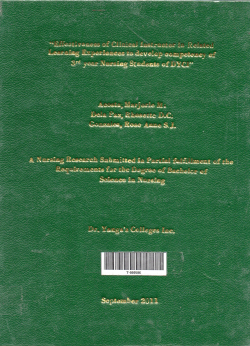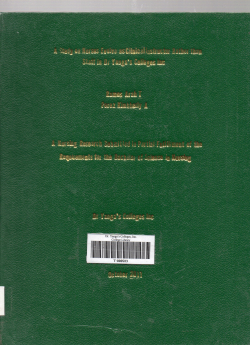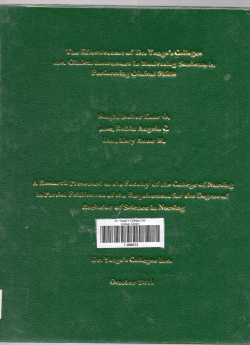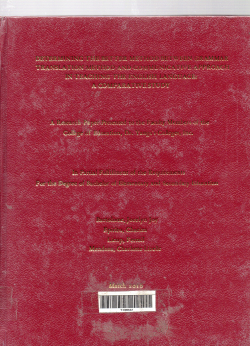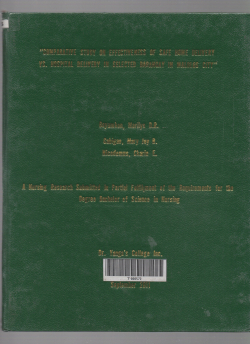A Comparative Study of Clinical Teaching Effectiveness between Part-time and Full-time Clinical Instructors in Dr. Yanga’s Colleges Inc. — College of Nursing

Type
Thesis
Authors
Category
CHS
[ Browse Items ]
Subject
teaching effectiveness;
Abstract
The purpose of this study was to compare the clinical teaching effectiveness between part-time and full-time clinical instructors in Dr. Yanga’s Colleges Inc. - College of Nursing. Results indicated that students strongly agree that part-time clinical instructors as significantly less effective as to full-time clinical instructors on each of five (5) categories measured and on the overall scale. Responses were sorted into five (5) categories: Teaching ability, Professional competence, Interpersonal relationships, Personality traits and Evaluation Practices. These results were supported by the findings for the two groups differed on all scales, as well as on overall scores on the instrument. The students’ perceptions of teaching effectiveness can be considered reliable.
It utilized the descriptive method research design to describe and interpret the differences between part-time and full-time clinical instructors’ clinical teaching effectiveness. The Clinical Instructors demographic profile was looked iito as moderator variables. The questionnaire was subjected to validation by a professional and its reliability was established using T-test. Populations of 85 nursing students were chosen in able to conduct the study. The researchers calculated the sampling size using the Slovin’s formula.
The study revealed that majority of the Part-Time Clinical Instructors of DYCI — CON is male. More than half of them are married. The bulk of the Part-Time Clinical Instructors is belonging to the age brackets of 20-30 years, 31-40 years and 51-60 years. Greater part of the group has an experience of 1-5 years, 11-15 years and 2 1-25 years. As to Educational Attainment of the respondents, all of them are bachelors’ degree and intravenous therapists’ holder. Preponderance of the group is MAN possessor. Only a small fraction of them are MSN carrier. While most of the Full-Time Clinical Instructors of DYCI-CON are female and are still single. They are mainly young professionals which oelong to the age bracket of 20 — 30 years old That is, more than half of them are on their twenties. Largest part of the group, have an experience of 1-5 years. With regard to Educational Attainment of the respondents, every one of them is bachelors degree and intravenous therapists’ holder. Predominance of the group is MAN possessor. 2 out of 21 respondents have earned MaEd level. And just a small fraction of them, are RM and PhD arrier. The results of the study further indicated that majority of the BSN IV students strongly agree in the quality possess by the Full-time Clinical Instructors in terms of teaching ability, professional competence, interpersonal relationship and personality traits than that of Part-time Clinical Instructors. And greater part of the BSN IV students agree with the evaluation practices possess by the Full-time Clinical Instructors and by the Part
— time Clinical Instructors. In line with all of these, in our research, our null hypothesis, There is no significant difference between Part-Time and Full-Time Clinical Instructors in terms of Clinical Teaching Effectiveness as perceived by the Student Nurses” is rejected, we could therefore say that there is a significant difference between Part-Time and Full-Time Clinical Instructors in terms of Clinical Teaching Effectiveness as perceived by the Student Nurses.
Finally, these results are very important in the face of current hiring practices in schools of nursing. Instruction is at the heart of the academic endeavor. If large numbers of part-time clinical instructor continue to be hired, programs and services that enhance the instructional skills of clinical instructor will be necessary to maintain a high level of instructional effectiveness.
It utilized the descriptive method research design to describe and interpret the differences between part-time and full-time clinical instructors’ clinical teaching effectiveness. The Clinical Instructors demographic profile was looked iito as moderator variables. The questionnaire was subjected to validation by a professional and its reliability was established using T-test. Populations of 85 nursing students were chosen in able to conduct the study. The researchers calculated the sampling size using the Slovin’s formula.
The study revealed that majority of the Part-Time Clinical Instructors of DYCI — CON is male. More than half of them are married. The bulk of the Part-Time Clinical Instructors is belonging to the age brackets of 20-30 years, 31-40 years and 51-60 years. Greater part of the group has an experience of 1-5 years, 11-15 years and 2 1-25 years. As to Educational Attainment of the respondents, all of them are bachelors’ degree and intravenous therapists’ holder. Preponderance of the group is MAN possessor. Only a small fraction of them are MSN carrier. While most of the Full-Time Clinical Instructors of DYCI-CON are female and are still single. They are mainly young professionals which oelong to the age bracket of 20 — 30 years old That is, more than half of them are on their twenties. Largest part of the group, have an experience of 1-5 years. With regard to Educational Attainment of the respondents, every one of them is bachelors degree and intravenous therapists’ holder. Predominance of the group is MAN possessor. 2 out of 21 respondents have earned MaEd level. And just a small fraction of them, are RM and PhD arrier. The results of the study further indicated that majority of the BSN IV students strongly agree in the quality possess by the Full-time Clinical Instructors in terms of teaching ability, professional competence, interpersonal relationship and personality traits than that of Part-time Clinical Instructors. And greater part of the BSN IV students agree with the evaluation practices possess by the Full-time Clinical Instructors and by the Part
— time Clinical Instructors. In line with all of these, in our research, our null hypothesis, There is no significant difference between Part-Time and Full-Time Clinical Instructors in terms of Clinical Teaching Effectiveness as perceived by the Student Nurses” is rejected, we could therefore say that there is a significant difference between Part-Time and Full-Time Clinical Instructors in terms of Clinical Teaching Effectiveness as perceived by the Student Nurses.
Finally, these results are very important in the face of current hiring practices in schools of nursing. Instruction is at the heart of the academic endeavor. If large numbers of part-time clinical instructor continue to be hired, programs and services that enhance the instructional skills of clinical instructor will be necessary to maintain a high level of instructional effectiveness.
Number of Copies
1
| Library | Accession No | Call No | Copy No | Edition | Location | Availability |
|---|---|---|---|---|---|---|
| Main | 569 | T C73 2011 | 1 | Yes |
